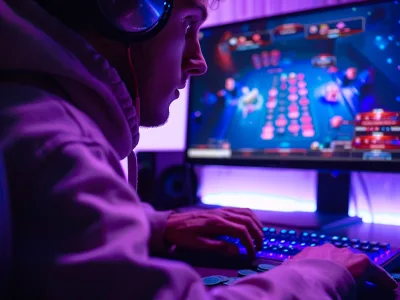I started playing online poker in college more than two decades ago. Something about the game just clicked, particularly Sit & Go’s back when barely anyone knew how to play them. My roommates used to sit on my floor, watching me try to reach my goal of making $100 a day playing $10 and $20 9man turbos.
Back then, there weren’t many days I didn’t make it. Oftentimes, I would hit it within the first few games and we’d be off to the bar to celebrate. The first pitcher of beer was always on me. If I had known how much tougher games would get in the years ahead, I probably would have never left that room.
But things started changing fast. First the regs got better. Then the recreationals got better. Then everyone started using the same training sites, same software, same strategies. Suddenly the game that brought me so much joy just felt like work.
The highs came further and further apart. The roommates all moved out and got ‘real’ jobs. And suddenly, there I was, grinding alone, joylessly, in the dark.
I made okay money for a while, but because the fun was gone, every setback left me feeling depleted and questioning every decision I’d ever made. That was when I learned that when you’re in the wrong mindset, poker can send you into an existential tailspin about the meaning of life.
When a surgeon saves a life, I used to think, they accomplished something worthwhile—regardless whether they had a good day or not. When a bricklayer has a bad day, the house gets built just the same. When a teacher helps their students develop, it doesn’t matter what spiral they fall into later that night.
But when you’re a poker player, a bad stretch can make you feel like life is slipping through your fingers as fast as your cash. If I’m doing something that’s entirely self-serving, the mind begins to wonder, what happens when it’s no longer serving me? How do I justify spending my days falling further and further behind?
Eventually the questions got so loud, I was considering quitting almost daily. Sometimes even hourly. And I might have done it too but in a desperate attempt to get inspired, I decided to start reading every day.
Poker books, it turns out, were my gateway drug to much bigger things. Super System, Harrington On Hold’em, Every Hand Revealed. I went in looking for strategy, but instead I learned about purpose. I’d find myself flipping through the books looking for anything about how these players handled adversity. I wanted to hear their advice for getting through hard times. I wanted to know what it was that kept them going. When I couldn’t find enough of that, I realized I wasn’t looking for a poker book, I was looking for a book about meaning.
In the two decades since, I’ve read more books that I can count, many dealing with the question of purpose.
Viktor Frankl’s Man’s Search For Meaning: Man should not ask what the meaning of his life is, but rather must recognize that it is he who is being asked.
Marcus Aurelius’ Meditations: Because most of what we say and do is not essential. Ask yourself at every moment, “Is this necessary?”
Michel De Montaigne’s essays: The value of life lies not in the length of days, but in the use we make of them… Whether you find satisfaction in life depends not on your tale of years, but on your will.
These teachers helped me see that purpose wasn’t something you picked, it was something you followed. They taught me that meaning reveals itself through the things that pull you. That you don’t have to see the whole path to get where you’re meant to be going—you only need to follow the energy of what excites you.
Poker became meaningful again when I stopped asking it to validate my life and started appreciating who it could help turn me into: someone who could find joy in hardship, who could continue putting effort when times were tough, who chased their destiny no matter what twists or turns blocked their way.
My old college roommates didn’t sit on my floor for free beer, they did it because it felt good to exert our will on the world—even when it’s only watching someone else do it. Those college nights weren’t about making money, or even about having fun, they were about discovering our power to shape the outcomes of our lives through will and practice alone.
It took me far too many years to realize that money was never the joy, chasing destiny was.

